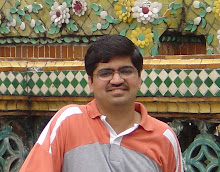Its been three weeks in the USA and given that its extremely cold outside, there is not much to do on the weekends and as such I have been able to catch up on some reading. One of the books that I read during this time is "Nive Lives", William Dalrymple's latest book.
India, its history, its recent rise as a potential economic power and prophecies of it becoming a super-power have been subjects of many books in the recent past. But here is a book that goes slightly off the beaten track and attempts to describe the role of the sacred or the place of religion in the lives of people in the sub-continent. Dalrymple, goes off to do what he does best, write a travelogue describing the lives of nine deeply religious people from across the sub-continent in a very impersonal, objective and matter-of-fact way. His objectiveness is particularly evident when he describes obscure practices and rituals of Tantriks and Bauls, which at times involve animal sacrifice, sex etc. These practices do not come out to the reader as wrong or right or gaudy, but just the way they are, with the author trying to explore the genesis of such rituals.
In the process of writing the book, the author once again travels the length and breadth of the sub-continent.
Sindh, Kangra/Dhramasala, Kerala, Karnataka, Bengal, Gujrat are some of the places the author visits. Stories span various religions from the extremely ascetic Jainism, Tibetan Buddhism, the Tantric sect of the Hindu Religion to the Sufism of the Sindh and are mostly set in small-town India where the place of religion and the sacred still plays a very important role in the lives of people. During this process the author visits some of the most unusal places and talks to some people that we folks living in Urban India and working in air-conditioned offices cannot even dream off.A crematorium in Tarapith with skulls and Tantriks being just one example of what I am talking about. It just goes on to show us folks that there is a world out there that we dont even know exists.The author also hints in some of the stories how religion and some rituals like the "theyyam" in Kerala, enable the dancer to transcend to a certain extent the barriers of caste.
So what did I learn from the book.Given that, I am not that pious or religious (I had hinted about it in my blog on Shegaon), but given that I am to a certain extent spiritual, I think the book demonstrates the power of the mind and ability of the mind to transcend the material and that human beings are capable of the unthinkable provided, they are able to train their mind and the thoughts that emanate from it.
In general, I think the book is a great read, but to be expected by a writer who gave us some amazing books like "In Xanudu", "The City of Djinns", "The Age of Kali". It is a travelogue from the author after quite a while. I would say that Dalrymple is certainly one of the best "Travel Writers" of recent times and I whole-heartedly recommend "Nine Lives"

No comments:
Post a Comment